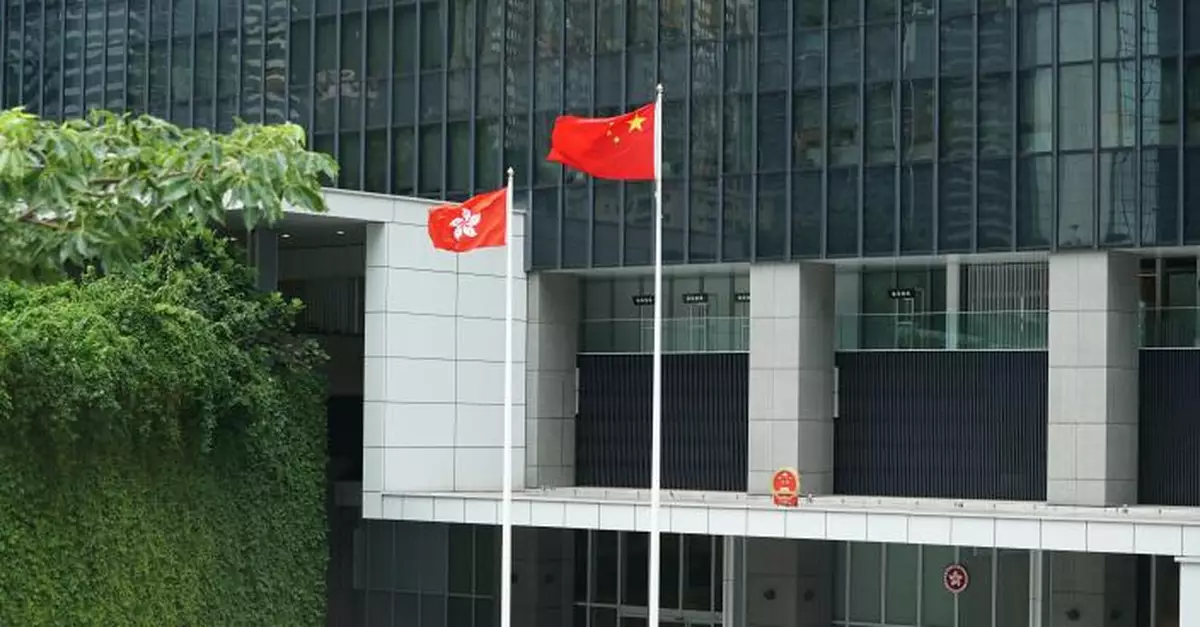HKSAR Government rejects misleading and untruthful remarks in so-called updated "business advisory" by US
The Government of the Hong Kong Special Administrative Region (HKSAR) today (September 7) rejected the misleading and untruthful remarks on Hong Kong's legal system and business environment in the so-called updated "business advisory" issued by various departments of the government of the United States (US) which tried to create panic. It is necessary for the HKSAR Government to make clarifications to set the record straight.
A spokesman for the HKSAR Government said, "The successful implementation of the laws relevant to safeguarding national security in the HKSAR has brought about a stable and safe environment conducive to business and investment. Under 'One Country, Two Systems', the rule of law in Hong Kong is strong and robust, with our common law system aligning with major global financial hubs. Hong Kong ranked fifth in global competitiveness this year, and its foreign direct investment inflow was the fourth largest in the world last year. Hong Kong was also the world's 10th largest trading entity in merchandise trade. These objective facts are the best evidence that high-level security guarantees high-quality development, and cannot be altered by so-called 'business advisory' issued by the governments of some countries."
The spokesman said, "It is each and every sovereign state's inherent right to enact laws safeguarding national security, and it is also an international practice. The offences endangering national security stipulated by the Hong Kong National Security Law (NSL) and the Safeguarding National Security Ordinance (SNSO) target acts endangering national security with precision, and define the elements and penalties of the offences with clarity.
"Since Hong Kong's return to the motherland, human rights in the city have always been robustly guaranteed constitutionally by both the Constitution and the Basic Law. The legal framework in safeguarding national security in the HKSAR is in line with relevant international human rights standards. The NSL and the SNSO clearly stipulate that human rights shall be respected and protected in safeguarding national security. The rights and freedoms enjoyed by Hong Kong residents under the Basic Law and the provisions of the International Covenant on Civil and Political Rights (ICCPR) and the International Covenant on Economic, Social and Cultural Rights as applied to the HKSAR are protected in accordance with the law. Nonetheless, just as the case with other places in the world, such rights and freedoms are not absolute. The ICCPR also expressly states that some of them may be subject to restrictions as prescribed by law that are necessary for protection of national security, public safety, public order or the rights and freedoms of others, etc.
"The HKSAR law enforcement agencies have been taking law enforcement actions based on evidence and strictly in accordance with the law in respect of the acts of the persons or entities concerned, which have nothing to do with their political stance, background or occupation. The prosecution has the burden to prove beyond reasonable doubt that the defendant had the actus reus and mens rea of an offence before the defendant may be convicted by the court. The laws and work relevant to safeguarding national security in the HKSAR will not affect normal business operations and local institutions, organisations and individuals that engage in normal exchanges worldwide. Law-abiding persons will not engage in acts and activities endangering national security and will not unwittingly violate the law.
"We have to highlight that the definition of 'state secret' in the SNSO is clear, and unless a person knows the relevant information is a state secret, or has reasonable grounds to believe it is a state secret and has an intent to endanger national security, the person will not commit the relevant offences.
"Regarding the offences of 'external interference endangering national security' and 'sabotage endangering national security' under the SNSO, both the National Security Act 2023 of the United Kingdom (UK) and the National Security Legislation Amendment (Espionage and Foreign Interference) Act 2018 of Australia introduced similar offences. While countries including the US, Australia and UK have set up foreign agent registration systems and foreign influence registration schemes of wide coverage, Hong Kong has not introduced such registration mechanisms so as to better facilitate all types of exchanges between Hong Kong and other countries and regions.
"The NSL, the SNSO and the offences related to seditious intention under the then Crimes Ordinance expressly protect expression of opinions or even criticisms against Government policies. What are prohibited are merely statements with seditious intention to incite hatred against or the overthrowing of the constitutional order of the country or the HKSAR, or the institutions thereunder. Such objective, constructive and lawful expressions of opinions are plainly distinguishable from the unlawful acts of dissemination of extremism and hate speech which no country and no place in the world would tolerate. Members of the public (including journalists, commentators, and columnists), as always, enjoy and exercise freedoms of the press and of speech in accordance with the law, without fear of unwittingly violating the law.
"With regard to the combatting of doxxing offences, all the enforcement work of the Office of the Privacy Commissioner for Personal Data (PCPD) to combat doxxing acts has been carried out strictly in accordance with the provisions of the Personal Data (Privacy) Ordinance (Chapter 486 of the Laws of Hong Kong). Same as the situation in other jurisdictions, the relevant prosecutions are tried and adjudged by courts at open hearings. During the investigations, when the need arises, the PCPD has always applied for search warrants from courts to enter premises and seize the relevant evidence. The relevant powers are similar to the criminal investigation powers in other jurisdictions.
"As for objectionable contents on the Internet, many countries and regions have already taken measures to deal with them. For instance, there are laws and regulation in the European Union and its member states requiring service providers to remove illegal content expeditiously upon receipt of notification from individual users or state authorities, including content that is harmful to children and adolescents, disinformation, hate speech and unsolicited marketing. The UK requires technology companies to bear legal responsibilities in preventing and expeditiously removing illegal content such as terrorism, while Australia can compel the removal of illegal online content related to child sexual exploitation and extremism. Recently, it was also revealed that the US government had asked a social media platform to remove disinformation about COVID-19 and vaccines."
The spokesman said that, "extraterritorial effect for the offences endangering national security under the NSL and the SNSO fully aligns with the principles of international law, international practice and common practice adopted in various countries and regions. It is both necessary and legitimate, and is also in line with those of other countries and regions around the world. It can be seen that the national security laws of various countries also have extraterritorial effect under the 'personality principle' and the 'protective principle'.
"As a matter of fact, during the public consultation of the Basic Law Article 23 legislation, 98.6 per cent of the submissions of opinions showed support and gave positive comments, reflecting a strong consensus in society for the legislation, and it is also the aspiration of the people. After the SNSO was passed by the Legislative Council unanimously, members of the public and various sectors of the community, including the commercial sector and major chambers of commerce, the legal sector, real estate association, the youth sector, other professional sectors and political parties, welcomed and voiced support for the legislation."
As revealed by a survey conducted by a major foreign chamber of commerce early this year, almost 80 per cent of its members interviewed expressed confidence in Hong Kong's rule of law, and almost 70 per cent expressed that their operations had not been impacted by the NSL; while the survey of another major foreign chamber of commerce released last month revealed that the business confidence in Hong Kong almost matched the pre-COVID level.
In fact, business communities from different countries have recognised the advantages of Hong Kong and been enthusiastic about doing business in the city, as evident by their continuous significant direct investments made in Hong Kong after the implementation of legislation of the NSL and SNSO. Invest Hong Kong has completed 358 projects in the first seven months of 2024, representing a substantial increase by 40 per cent as compared with that in the same period last year. Among them, 32 completed projects were from the US, which was ranked at the third place. In addition, according to the Report on Annual Survey of Companies in Hong Kong with Parent Companies Located outside Hong Kong, the number of companies stationed in Hong Kong exceeded 9 000 again in 2023 and the US was also ranked at the third place, with 1 273 companies.
"All in all, the cornerstone of Hong Kong's success remains intact. We urge the US government to stop making false and baseless accusations about the situation in Hong Kong and trying to create panic by issuing the so-called 'business advisory' to US companies and individuals operating in Hong Kong. As a free and open international city, Hong Kong continues to welcome overseas companies, including American companies, to make full use of the business opportunities introduced by Hong Kong and the Guangdong-Hong Kong-Macao Greater Bay Area, to set up offices in Hong Kong, and take Hong Kong as their regional headquarters or regional offices," the spokesman said.




